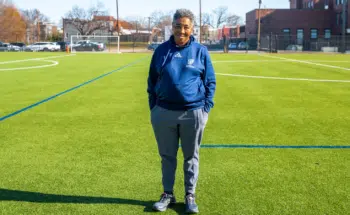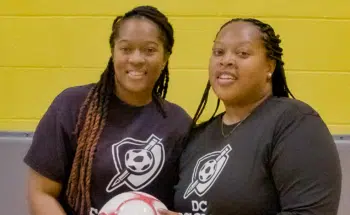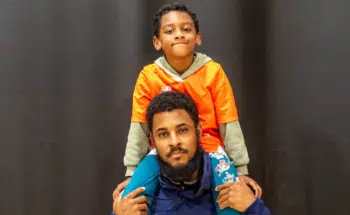With A DC SCORES Season Under Her Belt, Chief Program Officer Tierra Stewart Excited for New Year of Poet-Athlete Success

Chief Program Officer Tierra Stewart has only been at DC SCORES for a season, but she has already made a host of unforgettable memories in the organization’s soccer, poetry, and service-learning program.
One moment stands out in particular. In October, Stewart visited the DC SCORES middle school team at The Sojourner Truth School in Northeast DC. The squad was practicing for poetry slam, the culmination of DC SCORES’ writing curriculum.
“Walking into Truth, I was like a celebrity, there is such a strong regard for DC SCORES staff,” recalls Stewart, who by the end of the session was being asked to sign autographs for the team. “I’ve never been asked for my autograph in my life!” she exclaims.
Stewart says the experience was emblematic of what DC SCORES means to the youth it serves. “It was a really beautiful and engaged practice,” she shares. “They were picking up everything that we were putting down.”
Now, at the start of a year in which DC SCORES will celebrate its 30th anniversary, Stewart is looking to the future of the organization and embarking on work that will sustain the program for decades to come. “I joined the organization at a great time when we’re really at the precipice of thinking about what is the next level to really live out our commitments to the community,” she says. “We’re not just an after-school program, we’re an escape, a safe haven. We bring joy.”
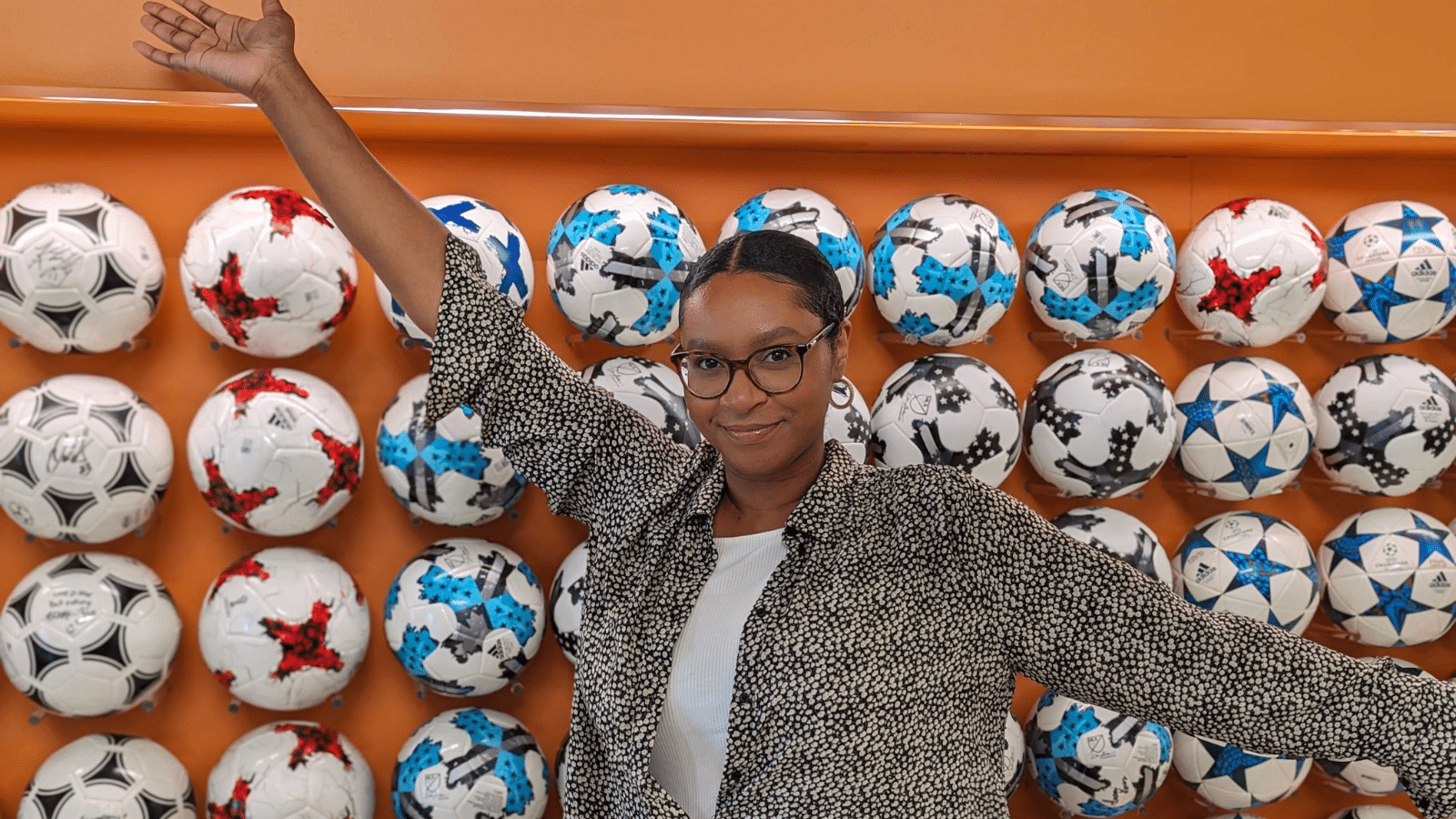
Stewart joined DC SCORES in August, 2023.
Dismantling Educational Barriers
Stewart knows firsthand that fostering a sense of justice in youth can lead to a lifetime of community engagement.
It was as a middle schooler, watching the devastation of Hurricane Katrina, and the failed government response to the disaster, wreaked on Black New Orleans residents that Stewart began exploring how to serve others.
“I wanted to be in service to my people because it didn’t seem like our pain and suffering were important to this country. I had one problem, I was deeply afraid to speak and to be heard,” she told Voyage Baltimore.
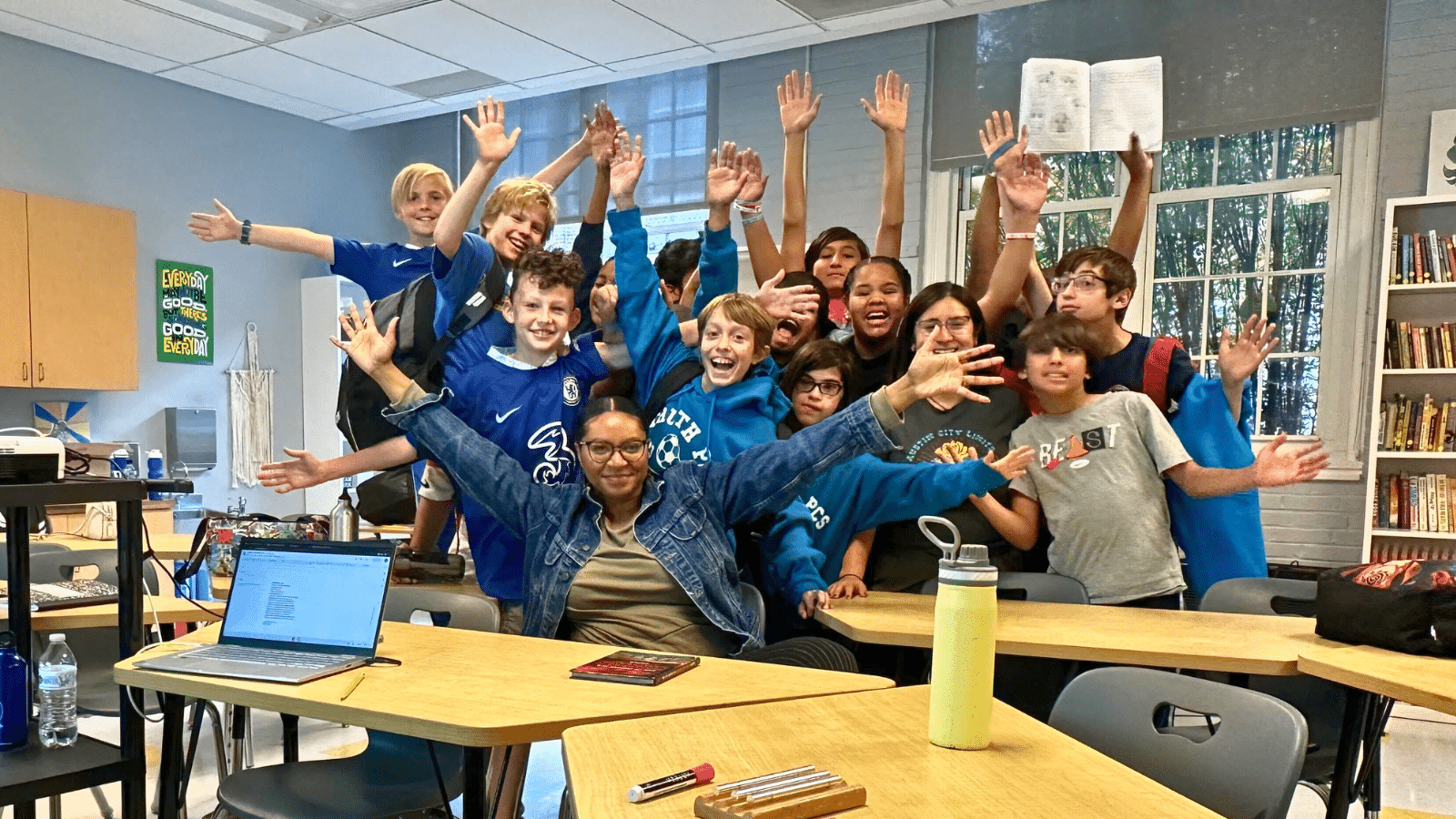
Stewart celebrates with poet-athletes at The Sojourner Truth School after a successful poetry practice.
Providing a voice to youth is a thread that runs through much of Stewart’s career. She has worked for a number of youth development nonprofits, including After-School All-Stars and IGNITE National. However, she did not always intend to work in the sector.
Inspired to amplify her own voice, Stewart joined debate teams and served as Class President in high school, before attending Ohio University to study political science, with the ultimate ambition of attending law school.
However, when she reached college, Stewart was dismayed to discover she was the only Black student in her classes. Today, less than 6.5% of students enrolled at the institution are Black. When Stewart attended, she says, that number was less than 5%.
“I realized the educational system intentionally worked not to include me or my ancestors, our interests, or liberation,” she has said of her college experience. “We are being positioned to assimilate as insubordination into a eurocentric dominated culture, and are being taught to be obedient and compliant with the systems.”
She founded LEAD THE WAY, a leadership development, community, and movement-building organization that empowers youth to engage in anti-oppressive leadership. The organization is expressly committed to dismantling capitalist, colonialist, imperialist, and patriarchal structures that keep so many young people locked out of educational resources and power.
She says, “[My work] is my way of resisting the paradigms that are already in place. My way of disrupting that is to directly invest in those who are already doing this work, who are already invested in our youth.”
.png)
Stewart, Blackwell, and players from the Washington Spirit present the Hart Middle School team with the Spirit award at Middle School Poetry Slam last year.
Working Directly With Youth
So, when DC SCORES advertised for a Chief Program Officer last year, Stewart didn’t hesitate to apply. “The mission statement was so deeply aligned with my personal mission in life, and I wanted to get back to working directly with youth in Washington, DC,” she says.
“My work prior to this was on a national scale, and I really wanted to transition into focusing on local efforts, which place youth at the center of driving decisions and driving what programming we prioritize,” she adds.
Leveraging after-school time in youth development is critical, says Stewart, citing studies that show that, between the hours of 3pm and 6pm, young people are more likely to become victims of violent crime or enticed into engaging in harmful activities.
What’s more, providing innovative and well-resourced after-school learning opportunities has the potential to disrupt the school-to-prison pipeline, educational policies and practices that funnel young people directly from schooling into incarceration and which Stewart describes as “a direct attack on our Black and Brown students.”
As DC’s young people contend with a myriad of challenges, from rising gun violence to the educational impacts of COVID-19, they deserve a community that embraces them and works against the forces negatively impacting their lives. DC SCORES can give them that, says Stewart.
“When you’re thinking about what is needed in the community, you don’t look at the fruits and say, ‘These are bad fruits,’” she stresses. “You look at the soil and as ‘What is it about this environment that continues to produce these things?’”
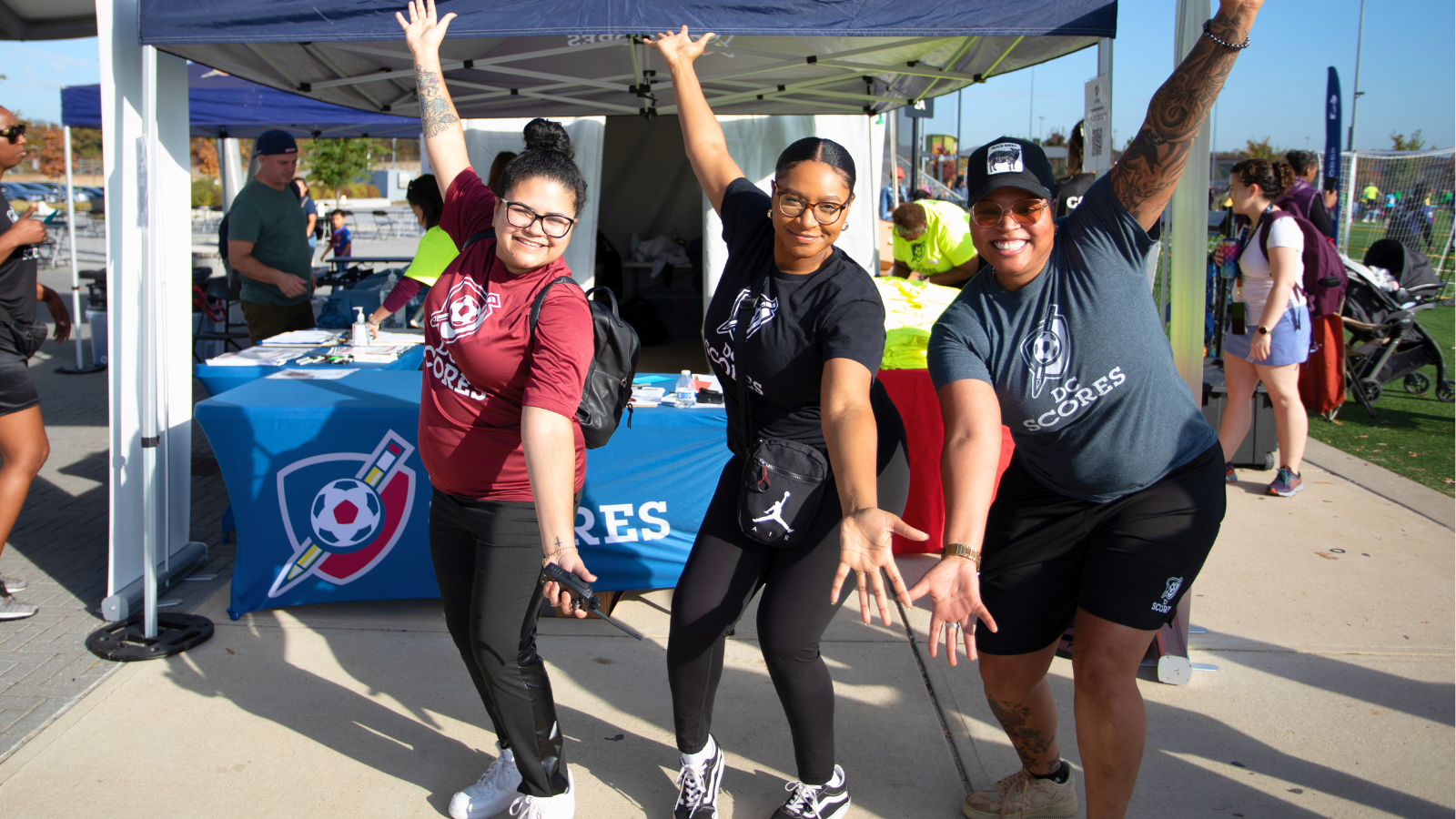
Alongside DC SCORES staff members Tatiana Figueroa Ramírez (left) and Charity Blackwell (right), Stewart welcomes teams and families to Fall Frenzy, DC SCORES’ annual fall community festival.
“Deep Sense of Belonging”
To continue to improve DC SCORES’ impact on District youth, Stewart has focused on staff and coach development. “Anything we’re asking our kids to do, we have to model ourselves, so focusing on our people is a big priority for me,” she says.
Program staff have completed training in active-participatory learning, the psychology of youth development, and Learn 24’s Youth Work Method Series, as they work together to revamp coach training and program standards with an aim to increasing program fidelity. The team wants to ensure that every single poet-athlete experiences the gold standard of what DC SCORES has to offer.
“I want us to get really, really clear on program standards and make sure everyone can see the youth development methods and principles that are directly linked to all of our programming and systems,” she says. “That is really tied to the community-building aspect of our work.”
Building community is what first inspired Stewart’s passion for service in her youth, and, through DC SCORES, she plans to inspire young people of the same age to develop a similar fervor. This season, her team will continue efforts to focus heavily on the non-profit’s middle school program to ensure that poet-athletes foster long-lasting community relationships before they age out of the program.
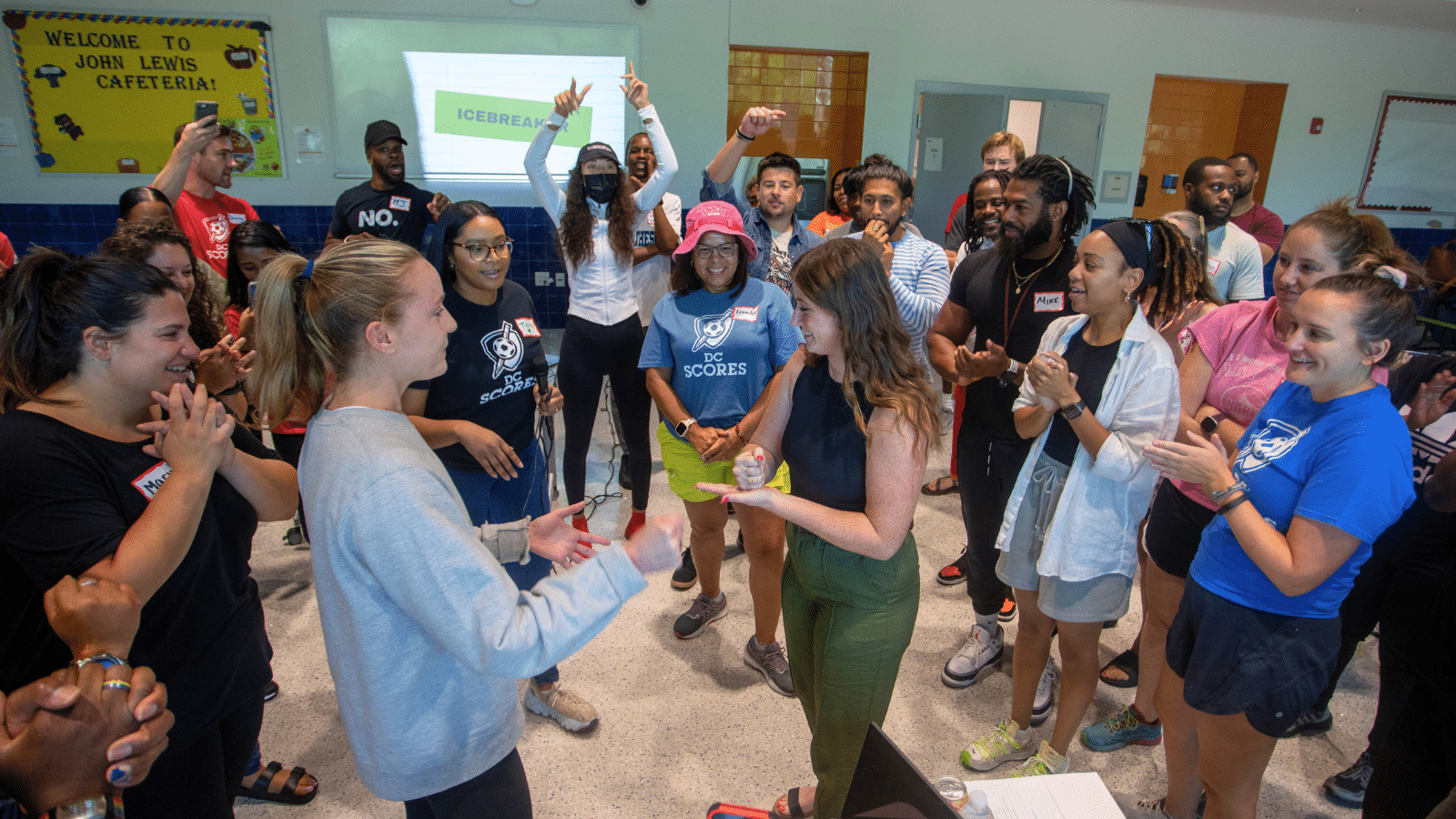
Stewart, pictured center right, leads a team-building exercise for DC SCORES coaches during Coach Kickoff last season.
Ultimately, she would like to expand the organization’s middle school offerings into a longer-term fellowship program that hires alumni to work for DC SCORES and continue their poet-athlete journey into adulthood.
Stewart knows that these visions for DC SCORES’ future are ambitious, but she believes that transformational change has humble origins. The simple act of turning up for the District’s young people through DC SCORES is enough to create ripples of change through whole communities.
“Our young people have to navigate so much before they even get into their school buildings,” she says. “But DC SCORES is not just an after-school program. It’s a place where students don’t have to think about anything else other than being in a space that is nurturing their deep sense of belonging.”


